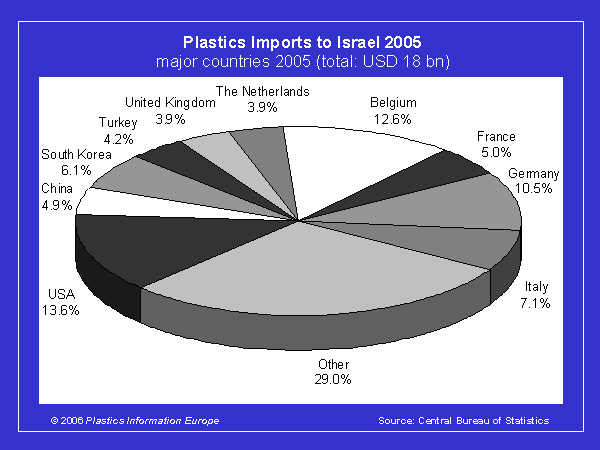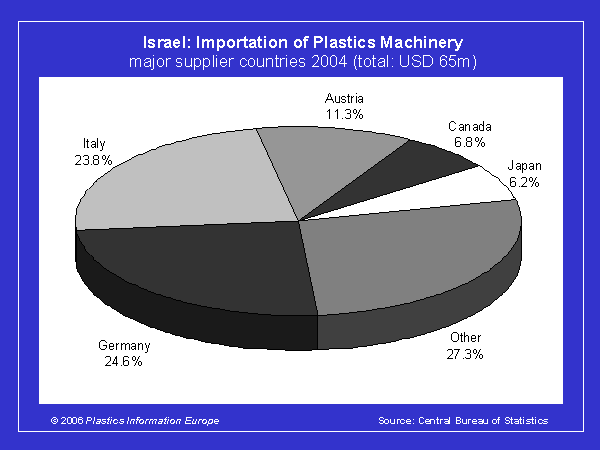ISRAEL
Plastics imports rise / Investment in plant and machinery needed
Israel enjoys a lively foreign trade in plastic and rubber products. Figures show that both imports and exports are increasing, as local production expands. Although imports are still dominated by suppliers from western industrialised countries, the role played by manufacturers from low-wage countries such as South Korea, China, Turkey and India is steadily increasing, due to price considerations.
Imports of machinery and equipment are rising, too, and, according to the German Office for Foreign Trade (bfai, Cologne; www.bfai.de) should continue growing beyond 2006. In Europe, Germany is an important trade partner for Israel. Some 10% of Israel´s plastics imports come from the country, and 9% of its plastics exports went to German customers.
Source: Monthly report on foreign trade statistics 12/2005 /
Central Bureau of Statistics
Imports of machinery and equipment are rising, too, and, according to the German Office for Foreign Trade (bfai, Cologne; www.bfai.de) should continue growing beyond 2006. In Europe, Germany is an important trade partner for Israel. Some 10% of Israel´s plastics imports come from the country, and 9% of its plastics exports went to German customers.
| Israel: Foreign trade with plastics and rubber (in USD million) | ||
| Year | Imports | Exports |
| 2002 | 1,069 | 1,277 |
| 2003 | 1,245 | 1,492 |
| 2004 | 1,597 | 1,733 |
| 2005 | 1,756 | 1,920 |
Central Bureau of Statistics
 | |
The need to stand up against international competition is forcing Israel´s local plastics industry players to invest in modern machinery and equipment. Although cyclical fluctuations have been observed, there has been a definite upswing in the amount of capital investment since 2003. According to the Israeli Association of Plastics and Rubber Manufacturers (Tel Aviv / Israel; www.industry.org.il), which counts 120 member companies, local converters spent USD 75m on imported plastics machinery in 2002. By 2005, the figure had risen to USD 102m. This is likely to increase by 10-15% a year from 2006, the association says.
German manufacturers hold an extremely strong market position in the field of plastics machinery. In 2004, as in 2003, Germany was the most important trading partner in this sector, accounting for some 25% of total imports. In all, Israel imported plastics machinery worth USD 65.4m in 2004.
Israel´s plastics industry is endeavouring to improve efficiency on a sustained basis, which is why increases in productivity play a major role in its companies´ investment decisions. Between 1998 and 2004, the size of the workforce in this industry rose by just 3%, while output per employee jumped by 55%.
 | |
According to the Central Bureau of Statistics (www.cbs.gov.il), plastics production in the country increased by 6% on average from 1998 to 2005, and CBS predicts growth will continue along these lines over the coming years. The growth of exports, which of course goes hand in hand with an increase in production, is having a multiple effect on imports.
On the one hand, advancing specialisation is leading to domestic demand being increasingly met by imports, even though the competition between Israeli and foreign manufacturers certainly exists. On the other hand, more primary products are being imported. Imports of plastics in non-primary form increased by around 50% from 2003 to 2005. The import of plastics in primary form nearly doubled within the same period. It is expected that imports will continue to grow over the next few years.
12.04.2006 Plasteurope.com [204965]
Published on 12.04.2006
